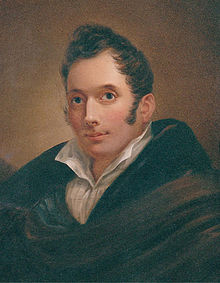Rudolf Christiani (politician)
Carl Rudolf Ferdinand Christiani (born January 27, 1797 in Copenhagen ; † January 21, 1858 in Celle ) was a German lawyer, revolutionary and, as a politician, an influential liberal member of the Second Chamber of the State Assembly of the Kingdom of Hanover . Because of his eloquence and expressiveness, he became known as the " Mirabeau of the Lüneburg Heath ".
Life
Christiani was the son of Johann Rudolf Christiani (1761–1841), pastor in Copenhagen (later pastor in Eutin and superintendent in Lüneburg ), and Caroline Auguste nee. Venturini . The parents' marriage was divorced in 1801 and the son grew up with the father. The mother remarried and published several novels under the name Caroline Auguste Fischer.
Rudolf Christiani studied law at the Universities of Kiel and Göttingen from November 1813 . In April 1815 he enrolled in Göttingen as a student. iur. from Denmark . In Göttingen he became a member of the Corps Hannovera and the literary student association Poetic Schusterinnung an der Leine under the name Danteut ; its members published the literary magazine Wünschelruthe in 1818 , to which he contributed. In 1818 he was admitted to the bar in his hometown of Lüneburg. In 1824 he became first interim and later also permanent city secretary of the city of Lüneburg. As a liberal politician, he was involved in the implementation of the constitution and the reforms of Stüve, such as the liberation of the peasants . As one of the main speakers in the Second Chamber of the Assembly of Estates, he lived up to his nickname. After the coup d'état by King Ernst August I , which suspended the constitutional law in 1837, he was one of the most outspoken critics of the new king's reactionary policies. As a Belletrist Schöngeist , he glorified the deceased liberal citizen king Wilhelm IV of Hanover and from then on held pleadings for the abolition of the monarchy.
In 1846 he took temporary retirement and spent the years 1846 to 1848 at the Danish Court in Copenhagen, where King Christian VIII took advantage of his expert legal advice on matters relating to the entire Danish state and the Schleswig-Holstein question . When he returned to Germany in the course of the political development in 1848 and the Schleswig-Holstein survey, this brought him considerable personal criticism, so that he no longer held any political public offices. From then on he devoted himself primarily to fiction in Lüneburg and died as a juror in Celle during a court hearing.
Relationship with the Heine family

Christiani married into the Heine family . He was with the well-off cousin of the poet Heinrich Heine , Charlotte Christiani born from Bordeaux . Heine (1813–1869), married. He also had a close friendship with Heine, which was also reflected in literary terms with Heine. Heine's parents lived from 1822 to 1826 in Lüneburg on Ochsenmarkt in what is now the Heinrich Heine House . Heine dedicated the poem to the young Christiani in Lüneburg times:
One cannot adore
this amiable youth enough;
He often treats me with oysters,
and with Rhine wine and liqueurs.
His skirt and panties sit neatly,
But the bandage is even more delicate,
And so he comes every morning,
asks whether I'm well;
Speaks of my great glory,
my grace, my jokes;
He is eager and busy
to serve me, to be of benefit to me.
And in the evening, in company,
with an enthusiastic face, he
declaimed
my divine poems to the ladies .
Oh, how delightful it is to
still find such a young man,
Now in our time, when
more and more the better are disappearing every day .
The relationship between the two explains why Heinrich Heine, in § 4 of his notarial will, drawn up in Paris in 1851, appointed Rudolf Christiani as the executor of his literary estate. An office that Christiani never assumed or assumed. The nickname "Mirabeau der Lüneburg Heath" goes back to Heine.
literature
- Heinrich Ferdinand Curschmann : Blue Book of the Corps Hannovera (1809–1899) , Göttingen 2002, p. 73, no. 180
- Werner H. Preuss: Rudolph Christiani (1798-1858). Verlag der Nation, Husum 2004, ISBN 978-3-373-00521-6 .
- Ferdinand Frensdorff : Christiani, Rudolf . In: Allgemeine Deutsche Biographie (ADB). Volume 4, Duncker & Humblot, Leipzig 1876, p. 213 f.
- Bernhard Mühlhan : Christiani, Rudolf. In: New German Biography (NDB). Volume 3, Duncker & Humblot, Berlin 1957, ISBN 3-428-00184-2 , p. 240 ( digitized version ).
Web links
- Literature by and about Rudolf Christiani in the catalog of the German National Library
- Heinrich Heine House Lueneburg
References and comments
- ^ Enrolled on April 13, 1815; Götz von Selle (ed.): The register of the Georg-August-Universität zu Göttingen - 1734-1837 . Leipzig 1937, Kraus Reprint, 1980, ISBN 978-3-262-00030-8
- ^ Heinrich F. Curschmann: Blue Book of the Corps Hannovera zu Göttingen, Volume 1: 1809-1899 . Göttingen 2002, No. 180.
- ↑ Josepha Grauheer, Eduard Arens: The poetic shoemaker guild on the leash (= Göttingische auxiliary hours , booklet 7). Otto Deneke, Göttingen 1929; August Heinrich Hoffmann von Fallersleben describes in his My Life, Notes and Memories. 1868. Volume 1, p. 110 Christiani in his student environment in Göttingen. ( Digitized version )
- ↑ Heine's will in full text at zeno.org
- ↑ This nickname goes back to Heinrich Heine and his poem To a former Goetheaner - full text on Wikisource .
| personal data | |
|---|---|
| SURNAME | Christiani, Rudolf |
| ALTERNATIVE NAMES | Christiani, Carl Rudolf Ferdinand (full name); Danteut (pseudonym) |
| BRIEF DESCRIPTION | German lawyer and politician |
| DATE OF BIRTH | January 27, 1797 |
| PLACE OF BIRTH | Copenhagen |
| DATE OF DEATH | January 21, 1858 |
| Place of death | Celle |
